Advantages and Disadvantages of Crystalline Waterproofing
Crystalline waterproofing is a popular method of protecting concrete structures from water penetration. Modern construction projects crystalline admixtures to render a sustainable waterproof coating.
Advantages of Crystalline Waterproofing
Crystalline waterproofing offers several advantages over other forms of waterproofing systems. Following are some of its benefits:
-
Permanent Solution
Crystalline waterproofing becomes an integral part of the concrete structure and forms a permanent barrier against water penetration. Unlike coatings or membranes that may deteriorate over time, the crystalline network remains intact due to the microscopic channels and pores within the concrete.
-
Effective
Crystalline waterproofing is effective at blocking water penetration, even under high hydrostatic pressure. This makes it an ideal solution for structures located in areas with high water tables. This waterproofing type is resistant to physical damage.
-
Cost-Effective
Crystalline waterproofing is a cost-effective solution for protecting concrete structures from water damage. It allows for a greater building footprint and reduced maintenance and repairs over a long period. Crystalline waterproofing is preferred by builders and property owners alike.
-
Chemical-Resistant
Crystalline waterproofing is resistant to chemical attack. Moreover, it can prevent the deterioration of concrete caused by exposure to harsh environments. In addition, it can heal cracks up to 0.4mm.
-
Environmentally Friendly
Crystalline waterproofing is an environmentally friendly procedure. It does not contain harmful chemicals (VOCs) or require special disposal methods. In addition, it can be recycled easily.
Read More
How to Prevent the Roof from Sun Heat in Pakistan?
How to Find Top Water and Heat Proofing in Karachi?
How Popular is Roof Cool Services in Pakistan?
Disadvantages of Crystalline Waterproofing
Apart from the benefits that crystalline waterproofing provides, there are some drawbacks too.
-
Limited application
Crystalline waterproofing is not effective on structures that are prone to movement or cracking. These conditions can damage the crystalline network and compromise the waterproofing barrier. Crystalline waterproofing requires dry conditions during application and curing.
-
Time-consuming
Applying crystalline waterproofing can be a time-consuming process, especially if it is applied as a surface treatment on walls and other structures. In addition, it is also costly.
-
Skilled labor
Crystalline waterproofing requires skilled labor and expertise to develop intricate mixtures, manage tools and materials, and ensure a safe patchwork.
-
Limited rework
If the crystalline network is damaged or compromised, repairing the waterproofing barrier can be challenging. This may require extensive excavation and reapplication of the waterproofing agent, which can be time-consuming and costly.
-
Initial cost
While crystalline waterproofing is a cost-effective solution in the long run, the initial cost may be higher than other waterproofing methods, making it less attractive to builders or property owners.
Read More
Top 5 Benefits of Applying Solar Reflective Paint in Pakistan
How to Apply Elastomeric Roof Coating in Karachi?
Does Heat Resistant Paint for Steam Pipes Work in Pakistan?
Conclusion
Crystalline waterproofing offers several advantages: It is a permanent solution for crevices and holes. Moreover, it is easy to apply, resistant to chemical attack, and environmental-friendly. On the other hand, it displays an unattractive picture to owners or residents because of high initial costs.
If your premises need renovation with regards to crevices or ruptures, contact Lakhwa Chemical Services today.
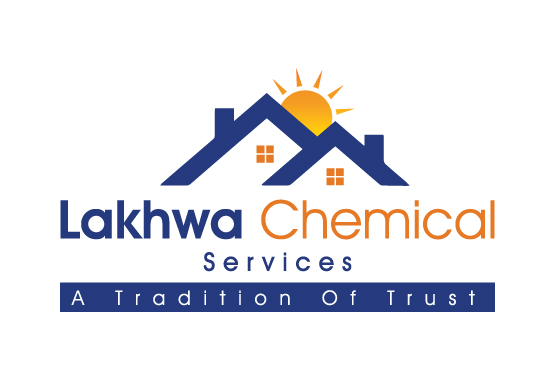
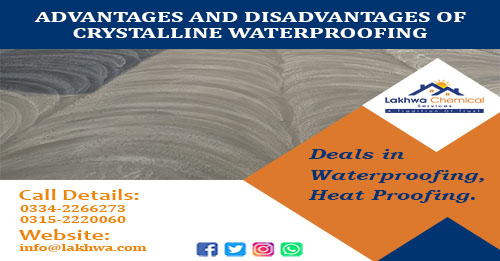
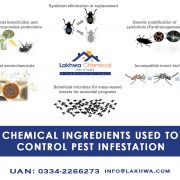
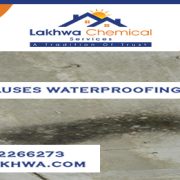

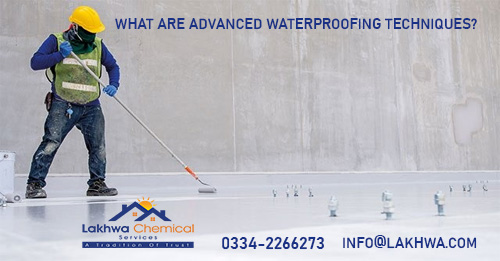
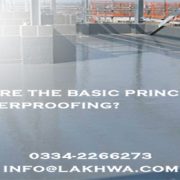
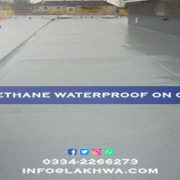
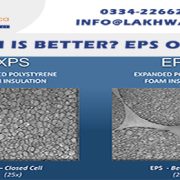
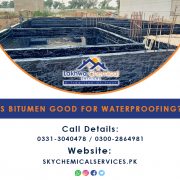


Leave a Reply
Want to join the discussion?Feel free to contribute!